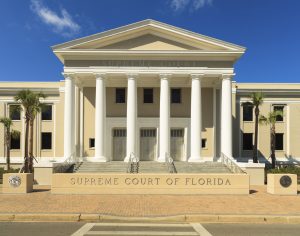 Divorce is a complex matter, and can be even more complex when the division of marital property is involved. Not only will courts use marital property to help determine such factors as property division and spousal or child support, but also, courts will take into consideration any personal property that was not made a part of the marital property. While the courts are guided by the law when determining how to divide property, it is possible for spouses to craft their own divorce agreement, usually through a prenuptial or postnuptial agreement, to assist in the dissolution of the marriage. Sometimes, even spouses who make separation agreements can run into bumps along the way. Recently, the Supreme Court of Florida ruled on the case Hahamovitch v. Hahamovitch, in which the court was asked to decide the extent of a provision within a separation agreement.
Divorce is a complex matter, and can be even more complex when the division of marital property is involved. Not only will courts use marital property to help determine such factors as property division and spousal or child support, but also, courts will take into consideration any personal property that was not made a part of the marital property. While the courts are guided by the law when determining how to divide property, it is possible for spouses to craft their own divorce agreement, usually through a prenuptial or postnuptial agreement, to assist in the dissolution of the marriage. Sometimes, even spouses who make separation agreements can run into bumps along the way. Recently, the Supreme Court of Florida ruled on the case Hahamovitch v. Hahamovitch, in which the court was asked to decide the extent of a provision within a separation agreement.
Marital and Separate Property
Before getting to the case, however, it is important to first look at property rules in Florida and how they can affect a divorce. Under Florida law, there are two recognized types of property – marital property and separate property. Marital property is any property that was owned or obtained during the time of the marriage or that was used in furtherance of the marriage. While this can cover a broad range of things, such as real estate, bank accounts, and even debts, there are exceptions to this rule. For example, while parties may be held to a court’s decision regarding property division, they will generally be free to enter into an agreement in order to lay out what property will be considered to be marital property.
Separate property concerns any property that is in sole ownership of one spouse and was not used in furtherance of the marriage. For example, items that were given as a gift or bequeathed, to one spouse, or property that was obtained either before the marriage or after the filing for divorce, would be viewed as separate property.
While this generally creates a divide between marital and separate property, there are ways for separate property to become marital property. Under Florida Statute 61.075, non-marital property may become marital if there was any enhancement to the property due to marital funds or assets. For example, if a spouse maintains a separate vehicle under his or her own name, but then uses money from a marital bank account, then the court may find that the vehicle is marital property.
Hahamovitch v. Hahamovitch
This case began, as with any divorce case, with a marriage. Before entering into marriage, however, the spouses, Dianna and Harry Hahamovitch, entered into a prenuptial agreement. Married in 1986, Dianna and Harry Hahamovitch remained married for 22 years until they filed for divorce in 2008. Naturally, it was at this time that the prenuptial agreement took effect. There was, however, a disagreement on what exactly the prenuptial covered. This is because, in the prenuptial agreement, the parties had agreed to waive any right that they have to claim any interest in separate property owned by the other spouse.
When the case went to trial, there was some dispute as to whether the provision within the prenuptial agreement waived the spouses’ rights to the sole property of the other spouse, even if the property was acquired during the marriage due to the parties’ marital efforts or appreciated in value during the marriage due to the parties’ marital efforts.
In this case, the trial court held that the prenuptial agreement was valid as written and that both parties successfully waived and released all rights and claims they might be entitled to as a result of the marriage. Similarly, the Fourth District Court of Appeal upheld the trial court’s decision, noting that the decision was fair when it was entered into, as both parties voluntarily agreed to the provisions of the agreement, both parties had legal counsel throughout the preparation and execution of the agreement, that there were multiple drafts of the agreement, and that the parties put in a lot of effort to make an agreement that was fair to both Mr. and Mrs. Hahamovitch. In addition, the court considered that, even without the interest of the personal property in question, the wife would have walked away from the marriage with around $1.9 million to be paid over a seven year period.
Finally, the court noted that the language used was sufficiently broad enough to waive any rights each spouse may have had in the other spouse’s property. It did, however, point out that other districts, such as the Second District Court of Appeals in Irwin v. Irwin and Valdes v. Valdes, held that similar language would not be sufficient to waive such rights.
While the case was brought before the Florida Supreme Court, the Court agreed with the lower courts, pointing out that, under Florida Statute 61.079, parties may contract regarding the disposition of property upon divorce. In addition, the court reasoned that the language of the prenuptial agreement was sufficient to properly waive each party’s rights in the opposing party’s separate property.
